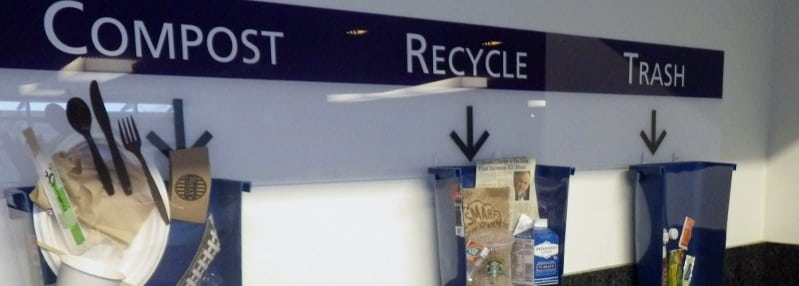Don’t Get Wasted. Get Sorted
The hospitality industry, more so than most, is one where busy trading and lots of waste goes hand in hand. From single use coffee cups and food containers, to paper napkins and hand towels, every aspect of every procedure in hospitality seems to make the bins fuller.
Here at Johnson Hospitality we want to help you to make sure that everything you need to dispose of ends up in the right bin so we have put together an easy list of common hospitality waste products and where they should end up.
There are three places something headed to the garbage can go. I know we’ve all been guilty of it, we’ve all worked at venues with the one single bin for all waste products. But we can do better, and in a wasteful industry such as ours, we can go a long way to reducing our contribution to the landfill problem our country faces.
In terms of waste disposal, the streams that it can end up in are the general waste, the recycling bin and the compost, and what should end up where may surpise you
General Waste |
Recycling |
Compost* |
| · Broken drinking glasses – The glass in drinking glasses has additives to give it extra clarity and strength. These additives make it unsuitable for glassware to be recycled as current glass recycling processes cannot process them.
· Broken crockery – Cannot be recycled, should go in the general waste bin · Cling wrap – soft plastics cannot be recycled unless your council has a specifc · Greaseproof paper – Paper that has been treated with wax cannot be recycled · Take away coffee cups – Although they are paper and paper is recyclable, paper coffee cups are lined with plastic or wax, which renders the coffee cups unprocessable at paper recycling facilities · Receipts – Receipt paper contains BPA which can contaminate the rest of the paper in the recycling process, as well as polluting nearby waterways. Landfill is the best place for thermal paper receipts.
|
· Glass bottles – look into getting a glass crushing machine to minimise the space taken up by glass waste, decrease waste collection expenditure and reduce noise pollution from your venue
· Cardboard packaging – flatten in to minimise the volume it takes up before placing it into a bin. · Cardboard food containers – make sure all food scraps are removed from the containers before placing in · Plastic food containers – Remove as much food as possible from the containers before throwing away · Plastic Drink Cups and Lids – These can be recycled, just give them a quick rinse where possible · Plastic Coffee Cup Lids– Where as traditional take away coffee cups have to go · Paper towels and napkins – If they don’t have too many food scraps on them, otherwise compost time · Plastic Drinking Straws – Plastic drinking straws are generally made of polypropylene, meaning they can be recycled. Unless of course they are made of PLA, in which case, they end up in the compost. · Food tins and lids – Are generally made from aluminium or stainless steel, both of which can be recycled. |
· Food Scraps – Food scraps except for large bones should end up in the compost heap
· Excess cooking oil – Excess cooking can be soaked up with paper towels or something similar then placed in the compost bin · Bagasse take away containers – can be placed in the compost bin · PLA – take away containers made with PLA are compostable and should not be placed in the recycling. · PLA Lined Take away coffee cups – Ranges like the envirochoice have PLA linings, meaning that they are compostable · Bamboo skewers, boats, cutlery – If it’s made from bamboo it will biodegrade. |

Our recommendation for splitting the 3 bins? Colour coded slim jim bins, they are space efficient, easy to tell apart and easy to empty.
Why not a grey bin with a 120L bin liner for your general waste?
An unlined blue bin for your recycling?
A green bin lined with a biodegradable bin liner for your composting bin?
If you are interested into minimising your contribution to land fills please contact your rep or call us on (02) 9052 9111 about making less wasteful waste decisions and we will be happy to sort you out.
*It should be noted that if you have no compost waste disposal arrangement in place, the contents of the compost bin should go in the general waste, not in the recycling.

